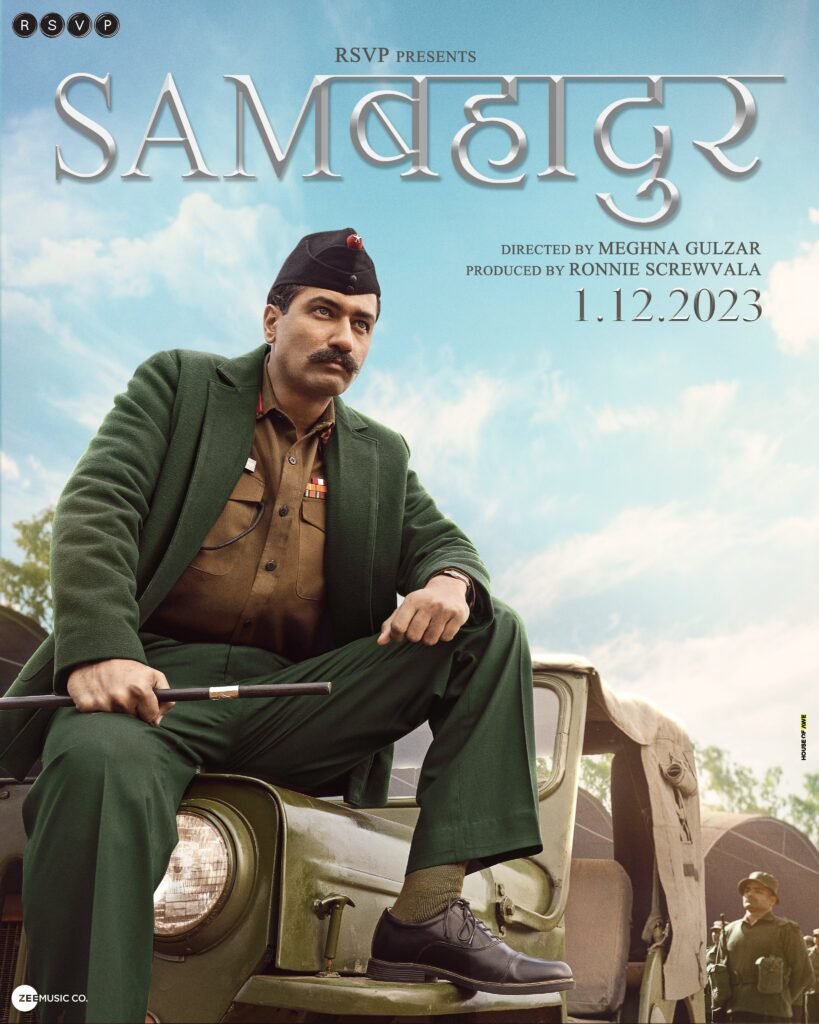Download Sam Bahadur (2023) Hindi 720p + 1080p + 2160p 4K
Download Sam Bahadur 720p + 1080p + 2160p 4K
Click The Below To Download Sam Bahadur
Sam Bahadur Movie PLot
In 1934, Cadet Sam Manekshaw is amongst the first batch of gentleman cadets to be trained at the Indian Military Academy, Dehradun; amongst his batchmates is his junior-cum-rival, Tikka Khan. Graduating from the academy that year, he is posted as a second lieutenant to the 12th Frontier Force Regiment, Ferozpur. Soon after his appointment, he meets Siloo Bode, whom he later marries. In 1942, during the Second World War, Manekshaw, promoted to the acting rank of major, is sent with the regiment to participate in the Burma campaign. During the Battle of Sittang Bridge, he is wounded in action but survives and is awarded the Military Cross for gallantry.
In 1947, amidst the partition of the British Indian Army, Major Manekshaw is approached to join the Pakistan Army by his colleague Maj. Yahya Khan; he chooses the Indian Army instead. Upon independence, discord emanates between the two countries over the sovereignty of Kashmir. In October 1947, Pakistan launches its military campaign to capture the region. In response, Indian prime minister Jawaharlal Nehru and home minister Vallabhbhai Patel dispatch Manekshaw and V. P. Menon to Kashmir; they succeed in securing the accession of Kashmir to India. India counter-attacks, but the war concludes in a stalemate.
In 1959, Manekshaw, now a major general and Commandant of the Defence Services Staff College, Wellington, is approached by defence minister V. K. Krishna Menon and Chief of General Staff Lt. Gen. Brij Mohan Kaul of his opinion on the Chief of Army Staff (COAS) Gen. K. S. Thimayya. Manekshaw, interpreting their actions as political interference, rebuffs them. However, Kaul conspires to stop Manekshaw’s upcoming promotion by orchestrating a court-martial on the basis of impropriety; nevertheless, but Manekshaw is exonerated by his superiors.
In 1962, the Sino-Indian War erupts, leading to the army being trounced by the Chinese; Kaul resigns while Nehru dismisses Menon. On the advice of Indira Gandhi, Nehru has Manekshaw promoted to lieutenant-general and assigns him as commanding officer of the IV Corps, Tezpur. He proposes an advance, but Nehru, forlorn from defeat, refuses; Indira intercedes in Manekshaw’s favour. By 1963, Manekshaw manages to re-rally his troops in the North-East Frontier Agency. In 1964, Nehru dies, and Manekshaw is promoted as general commanding officer of the Eastern Command; two years later, Indira is appointed prime minister. Between 1965 and 1967, Manekshaw involves himself in the anti-insurgency operations against the Mizo National Front, for which he earns the Padma Bhushan.
In 1969, with discord amongst the Bengalis in East Pakistan rising, Yahya, now a general, is made Pakistan’s president; elsewhere, Manekshaw is appointed as the Indian Army’s next COAS and promoted to general as well. In 1970, the East Pakistan-based Awami League sweep Pakistan’s general elections, however Yahya refuses to cede power to them, resulting in anti-government protests across Pakistan. In response, Yahya authorises Tikka, now a lieutenant-general, to initiate Operation Searchlight – a massive anti-Bengali program, which he executes with ruthless efficiency. Considering the situation, Indira favours war, but Manekshaw opposes it, highlighting the army’s hindrances; she agrees to wait. The U.S. warns Indira against war, but she rebuffs them. The army is mobilised and begins training the Mukti Bahini.
On 3 December 1971, Pakistan strikes first, launching pre-emptive attacks on Indian territory. India immediately responds with counter-attacks in Pakistan’s western and eastern sectors. The opposing armies witness profound clashes, with Pakistan bearing numerous casualties on land, sea and air in both sectors. By 16 December, the Pakistani troops in the east, overwhelmed, surrender to the Eastern Command – ending the war. The conclusion cedes a political triumph to Indira while Yahya resigns from the humiliation of defeat. With Manekshaw’s retirement approaching, Indira has him to be promoted to the rank of field-marshal in recognition of his wartime leadership; he proudly retires in January 1973.
Source : Wikipedia
